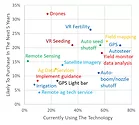Items Tagged with 'variable rate seeding'
ARTICLES
What Farmers Want From You
Variable rate, yield monitoring & more offer potential for quick return on investment
Read More
Your Customer Update
Turning Technology Into Profit Requires a Strategic Plan
GPS guidance, variable-rate seeding and other precision practices have provided Ohio’s Brian Watkins with a 145% return on investment.
Read More



![[Technology Corner] A Big Step Forward for Interoperability & Data Sharing](https://www.precisionfarmingdealer.com/ext/resources/2025/12/12/A-Big-Step-Forward-for-Interoperability--Data-Sharing.webp?height=290&t=1765565632&width=400)


